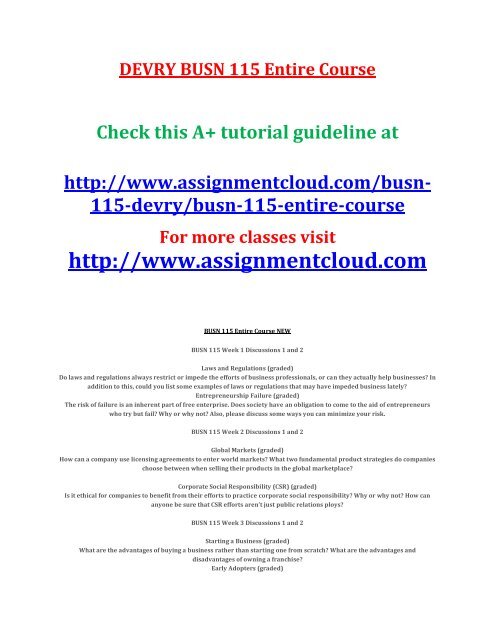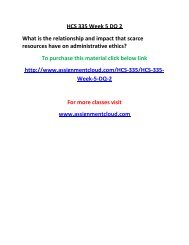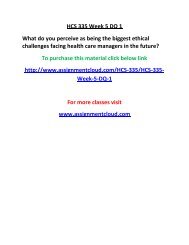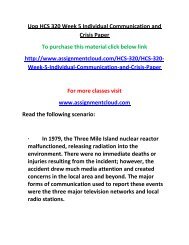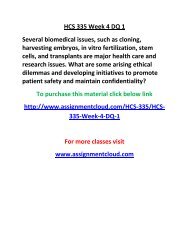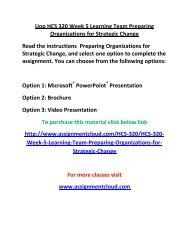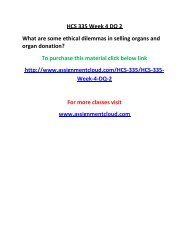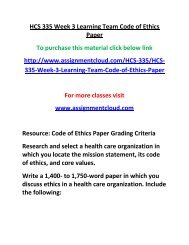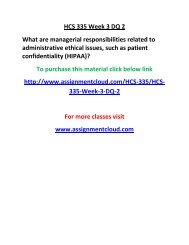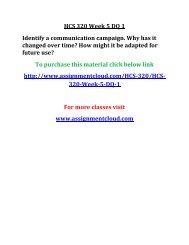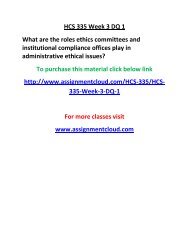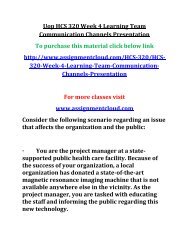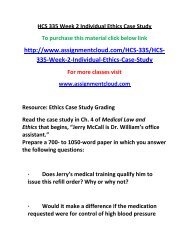DEVRY BUSN 115 Entire Course
devry busn 115, devry busn 115,devry busn 115complete course,devry busn 115entire course,devry busn 115week 1,devry busn 115week 2,devry busn 115week 3,devry busn 115week 4,devry busn 115week 5,devry busn 115tutorials, devry busn 115assignments, devry busn 115help
devry busn 115, devry busn 115,devry busn 115complete course,devry busn 115entire course,devry busn 115week 1,devry busn 115week 2,devry busn 115week 3,devry busn 115week 4,devry busn 115week 5,devry busn 115tutorials, devry busn 115assignments, devry busn 115help
Create successful ePaper yourself
Turn your PDF publications into a flip-book with our unique Google optimized e-Paper software.
<strong>DEVRY</strong> <strong>BUSN</strong> <strong>115</strong> <strong>Entire</strong> <strong>Course</strong><br />
Check this A+ tutorial guideline at<br />
http://www.assignmentcloud.com/busn-<br />
<strong>115</strong>-devry/busn-<strong>115</strong>-entire-course<br />
For more classes visit<br />
http://www.assignmentcloud.com<br />
<strong>BUSN</strong> <strong>115</strong> <strong>Entire</strong> <strong>Course</strong> NEW<br />
<strong>BUSN</strong> <strong>115</strong> Week 1 Discussions 1 and 2<br />
Laws and Regulations (graded)<br />
Do laws and regulations always restrict or impede the efforts of business professionals, or can they actually help businesses? In<br />
addition to this, could you list some examples of laws or regulations that may have impeded business lately?<br />
Entrepreneurship Failure (graded)<br />
The risk of failure is an inherent part of free enterprise. Does society have an obligation to come to the aid of entrepreneurs<br />
who try but fail? Why or why not? Also, please discuss some ways you can minimize your risk.<br />
<strong>BUSN</strong> <strong>115</strong> Week 2 Discussions 1 and 2<br />
Global Markets (graded)<br />
How can a company use licensing agreements to enter world markets? What two fundamental product strategies do companies<br />
choose between when selling their products in the global marketplace?<br />
Corporate Social Responsibility (CSR) (graded)<br />
Is it ethical for companies to benefit from their efforts to practice corporate social responsibility? Why or why not? How can<br />
anyone be sure that CSR efforts aren’t just public relations ploys?<br />
<strong>BUSN</strong> <strong>115</strong> Week 3 Discussions 1 and 2<br />
Starting a Business (graded)<br />
What are the advantages of buying a business rather than starting one from scratch? What are the advantages and<br />
disadvantages of owning a franchise?<br />
Early Adopters (graded)
Do you consider yourself an early adopter when it comes to trying out new products or new fashions, or do you tend to take a<br />
wait-and-see attitude? How does your attitude toward new products and new ideas influence your decision making as a<br />
consumer?<br />
<strong>BUSN</strong> <strong>115</strong> Week 4 Discussions 1 and 2<br />
Purchasing Process (graded)<br />
Think of a product you recently purchased and review your decision process. Why did you need or want that product? How did<br />
the product’s marketing influence your purchase decision? How did you investigate the product before making your purchase<br />
decision? Did you experience cognitive dissonance after your decision?<br />
Advertising (graded)<br />
Think about an advertisement (in any medium) that had either a strongly positive or strongly negative effect on your attitude<br />
toward the product being advertised or the advertiser itself. Why did the ad have this effect? If you responded positively to the<br />
ad, do you think you were being manipulated in any way? If you responded negatively—and you are a potential buyer of the<br />
product that was advertised—what changes would you make to the ad to make it more successful?<br />
<strong>BUSN</strong> <strong>115</strong> Week 5 Discussions 1 and 2<br />
Motivation Theories(graded)<br />
Chapter 10 discusses several styles of leadership, including autocratic, democratic, and laissez-faire. How do each of these<br />
styles relate to Theory X and Theory Y assumptions about workers?<br />
Benefit Choices (graded)<br />
When you begin interviewing as you approach graduation, you will need to analyze job offers that include a number of financial<br />
and nonfinancial elements. Which of these aspects of employment are your top three priorities: a good base wage; bonus or<br />
commission opportunities, profit-sharing potential; rapid advancement opportunities; flexible work arrangements; good<br />
healthcare insurance coverage; or a strong retirement program? Which of these elements would you be willing to forego in<br />
order to get your top three?<br />
<strong>BUSN</strong> <strong>115</strong> Week 6 Discussions 1 and 2<br />
Supply-Chain Management (graded)<br />
How can supply-chain management (SCM) help a company establish a competitive advantage? What are ways that companies<br />
can improve their supply chains?<br />
Technology Improvement (graded)<br />
Business is stalled. Sales last month were 10 percent less than the previous month and so far this month is looking even worse<br />
than last month. Could technology help you answer the decrease in sales? What technologies could you deploy to increase<br />
sales?<br />
<strong>BUSN</strong> <strong>115</strong> Week 7 Discussions 1 and 2<br />
Accounting Firm (graded)<br />
The senior partner of an accounting firm is looking for ways to increase the firm’s business. What other services besides<br />
traditional accounting can the firm offer to its clients? What new challenges might this additional work create?<br />
Financial Control (graded)<br />
The company you cofounded last year is growing rapidly and has strong prospects for an IPO in the next year or two. The<br />
additional capital that an IPO could raise would let you hire the brightest people in the industry and continue to innovate with<br />
new product research. There is one potential glitch: You and the rest of the executive team have been so focused on launching<br />
the business that you haven’t paid much attention to financial control. You’ve had plenty of funds from venture capitalists and<br />
early sales, so working capital hasn’t been a problem, but an experienced CEO in your industry recently told you that you’ll<br />
never have a successful IPO unless you clean up the financial side of the house. Your cofounders say they are too busy chasing<br />
great opportunities right now and they want to wait until right before the IPO to hire a seasoned financial executive to put<br />
things in order. What should you do and why?<br />
<strong>BUSN</strong> <strong>115</strong> All Quizzes<br />
<strong>BUSN</strong> <strong>115</strong> Quiz 2
(TCO 1) A(n) _____ is a framework of how a business intends to generate revenue.<br />
strategic management tool<br />
profitability analysis<br />
competitive advantage<br />
entrepreneurial mindset<br />
Instructor Explanation: Chapter 1, page 4<br />
Points Received: 5 of 5<br />
Comments:<br />
Question 2. Question : (TCO 1) All internal and external groups affected by a company’s activities are referred to as its _____.<br />
customers<br />
stakeholders<br />
employees<br />
suppliers<br />
Instructor Explanation: Chapter 1, page 10<br />
Points Received: 5 of 5<br />
Comments:<br />
Question 3. Question : (TCO 1) The _____ function of a business involves the recruiting, hiring, and support of its personnel.<br />
finance<br />
human resources<br />
accounting<br />
information technology<br />
Instructor Explanation: Chapter 1, page 14<br />
Points Received: 5 of 5<br />
Comments:<br />
Question 4. Question : (TCO 1) _____ is defined as having two consecutive quarters of decline in the country’s gross domestic<br />
product.<br />
Stagnation<br />
Immobilism<br />
Stagflation<br />
Recession<br />
Instructor Explanation: Chapter 2, page 36<br />
Points Received: 5 of 5<br />
Comments:<br />
Question 5. Question : (TCO 1) _____ unemployment is the natural movement of workers into and out of jobs, such as when a<br />
person quits one job without first lining up a new job.<br />
Intrinsic<br />
Frictional<br />
Cyclical<br />
Seasonal<br />
Instructor Explanation: Chapter 2, page 37<br />
Points Received: 0 of 5<br />
Comments:<br />
Question 6. Question : (TCO 1) _____ taxes are levied on earnings of individuals to help fund Social Security, Medicare, and<br />
unemployment compensation.<br />
Payroll<br />
Sales<br />
Income<br />
Property<br />
Instructor Explanation: Chapter 2, page 40<br />
Points Received: 5 of 5<br />
Comments:
Question 7. Question : (TCO 1) _____ intelligence involves reasoning, problem solving,<br />
Emotional<br />
Social<br />
Collaborative<br />
Networking<br />
Instructor Explanation: Chapter 7, page 150<br />
Points Received: 5 of 5<br />
Comments:<br />
Question 8. Question : (TCO 1) A(n) _____ is a specific, short-range target or aim.<br />
tactic<br />
strategy<br />
objective<br />
vision<br />
Instructor Explanation: Chapter 7, page 147<br />
Points Received: 5 of 5<br />
Comments:<br />
Question 9. Question : (TCO 1) _____ leaders act as advisors and supporters and generally let subordinates chart and adjust their<br />
own course toward meeting agreed-upon goals and objectives.<br />
Consultative<br />
Autocratic<br />
Transactional<br />
Laissez-faire<br />
Instructor Explanation: Chapter 7, page 151<br />
Points Received: 5 of 5<br />
Comments:<br />
Question 10. Question : (TCO 2) The United States restricts the import of peanuts to a maximum of 1.7 million pounds per year<br />
to protect the price that domestic producers can charge. This is an example of a(n) _____.<br />
Student Answer: import subsidy<br />
embargo<br />
import quota<br />
import tariff<br />
restrictive import standard<br />
Instructor Explanation: Chapter 3, page 53<br />
Points Received: 5 of 5<br />
Comments:<br />
Question 11. Question : (TCO 2) The _____ was established to foster international financial cooperation and its primary functions<br />
include providing short-term loans to countries that are unable to meet their financial obligations and working to alleviate<br />
poverty in developing economies.<br />
World Commerce Center<br />
European Union<br />
North American Free Treaty<br />
International Monetary Fund<br />
Instructor Explanation: Chapter 3, page 54<br />
Points Received: 5 of 5<br />
Comments:<br />
Question 12. Question : (TCO 2) Transparency International is a(n) _____.<br />
watchdog group that works to reduce business-government corruption around the world<br />
agency that works toward implementing protectionist regimes across the globe<br />
agency of the United Nations that is formed to mediate international negotiations<br />
agency of the United Nations that is formed to investigate transparency issues in international trade<br />
Instructor Explanation: Chapter 3, page 59<br />
Points Received: 5 of 5<br />
Comments:
Question 13. Question : (TCO 2) _____ refers to the degree to which information flows freely within an organization, among<br />
managers and employees, and outward to stakeholders.<br />
Whistle-blowing<br />
Transparency<br />
Utilitarianism<br />
Instructor Explanation: Chapter 4, page 71<br />
Question 14. Question : (TCO 2) Which of the following is an example of whistle-blowing?<br />
An employee suggests some process changes to his manager that he claims will increase the productivity of the team.<br />
An employee avoids taking ownership of his mistakes by blaming it on his coworkers.<br />
An employee informs the manager that some of his team members are misusing confidential customer details from the<br />
company database.<br />
An employee who is unsatisfied with his performance appraisal requests his manager for a re-evaluation of his performance.<br />
Instructor Explanation: Chapter 4, page 72<br />
Points Received: 5 of 5<br />
Comments:<br />
Question 15. Question : (TCO 2) Which of the following statements is true regarding ethical decision making?<br />
The disclosure of information by a company insider that exposes unethical behavior by others within the organization is called<br />
an ethical lapse.<br />
Stakeholders’ needs often conflict, requiring managers to make tough decisions about resource allocation.<br />
Making objective decisions will lead to ethical lapses.<br />
When the question of what is right and what is wrong is clear, ethical decisions are easy<br />
to implement.<br />
Instructor Explanation: Chapter 4, page 73<br />
<strong>BUSN</strong> <strong>115</strong> Quiz 4<br />
Question 1 (TCO 3) Which of the following is true about a small business?<br />
A small business is one that is not dominant in its field.<br />
A small firm usually curtails the freedom to innovate.<br />
A small firm avoids risks that larger firms are willing to take.<br />
Instructor Explanation: Page 117<br />
Points Received: 5 of 5<br />
Comments:<br />
Question 2. Question : (TCO 3) Barbara owns a small florist shop that employs a couple of part-time floral designers. She doesn’t<br />
expect her business to grow much, but it provides her with a comfortable income and she enjoys what she does. Barbara’s<br />
business would be described as a<br />
retail business<br />
lifestyle business<br />
high-growth venture<br />
service business<br />
Instructor Explanation: Page 118<br />
Points Received: 5 of 5<br />
Comments:<br />
Question 3. Question : (TCO 3) Three factors contributing to the increased number of small businesses are technologies such as<br />
e-commerce, growing diversity in entrepreneurship, and _____.<br />
increased ease in going public<br />
nationalization<br />
market regulation<br />
monopolistic business practices<br />
Instructor Explanation: Page 120<br />
Points Received: 5 of 5<br />
Comments:
Question 4. Question : (TCO 3) Charles is the purchase agent for a consulting firm. He places orders for office stationeries and<br />
consumables once in two weeks. The purchases are made in large quantities and are billed in the firm’s name. The items that<br />
Charles buys are examples of<br />
expense items<br />
capital items<br />
shopping products<br />
convenience products<br />
Instructor Explanation: Page 317<br />
Points Received: 5 of 5<br />
Comments:<br />
Question 5. Question : (TCO 3) The introductory stage will be followed by a _____ stage for a successful product.<br />
research<br />
saturation<br />
growth<br />
infiltration<br />
Instructor Explanation: Page 318<br />
Points Received: 5 of 5<br />
Comments:<br />
Question 6. Question : (TCO 3) People who monitor social media to spot shifts in consumer tastes are called _____.<br />
trend watchers<br />
crowd pullers<br />
social developers<br />
social programmers<br />
Instructor Explanation: Page 319<br />
Points Received: 5 of 5<br />
Comments:<br />
Question 7. Question : (TCO 4) Consumer purchasing differs from organizational purchasing in that consumer purchasing _____.<br />
follows a formal buying process<br />
has greater complexity in product usage<br />
involves closer relationships between buyers and sellers<br />
has a greater emphasis on economic payback<br />
Instructor Explanation: Page 299<br />
Points Received: 5 of 5<br />
Comments:<br />
Question 8. Question : (TCO 4) The process of examining an organization’s current marketing situation, assessing opportunities<br />
and setting objectives, and then developing a marketing strategy to reach those objectives is called _____.<br />
strategic marketing planning<br />
marketing research<br />
social commerce<br />
marketing concept<br />
Instructor Explanation: Page 301<br />
Points Received: 5 of 5<br />
Comments:<br />
Question 9. Question : (TCO 4) Selling existing products to new markets is called _____.<br />
product development


